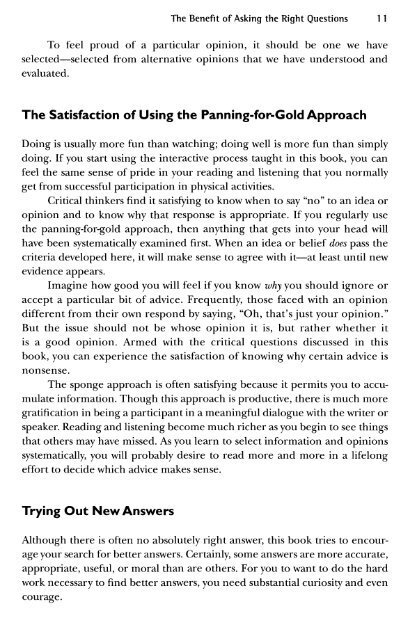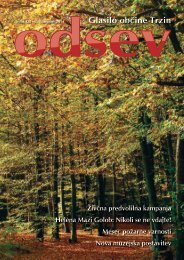Asking the Right Questions, A Guide to Critical Thinking, 8th Ed
Asking the Right Questions, A Guide to Critical Thinking, 8th Ed
Asking the Right Questions, A Guide to Critical Thinking, 8th Ed
Create successful ePaper yourself
Turn your PDF publications into a flip-book with our unique Google optimized e-Paper software.
The Benefit of <strong>Asking</strong> <strong>the</strong> <strong>Right</strong> <strong>Questions</strong> 11<br />
To feel proud of a particular opinion, it should be one we have<br />
selected—selected from alternative opinions that we have unders<strong>to</strong>od and<br />
evaluated.<br />
The Satisfaction of Using <strong>the</strong> Panning-for-Gold Approach<br />
Doing is usually more fun than watching; doing well is more fun than simply<br />
doing. If you start using <strong>the</strong> interactive process taught in this book, you can<br />
feel <strong>the</strong> same sense of pride in your reading and listening that you normally<br />
get from successful participation in physical activities.<br />
<strong>Critical</strong> thinkers find it satisfying <strong>to</strong> know when <strong>to</strong> say "no" <strong>to</strong> an idea or<br />
opinion and <strong>to</strong> know why that response is appropriate. If you regularly use<br />
<strong>the</strong> panning-for-gold approach, <strong>the</strong>n anything that gets in<strong>to</strong> your head will<br />
have been systematically examined first. When an idea or belief does pass <strong>the</strong><br />
criteria developed here, it will make sense <strong>to</strong> agree with it—at least until new<br />
evidence appears.<br />
Imagine how good you will feel if you know why you should ignore or<br />
accept a particular bit of advice. Frequently, those faced with an opinion<br />
different from <strong>the</strong>ir own respond by saying, "Oh, that's just your opinion."<br />
But <strong>the</strong> issue should not be whose opinion it is, but ra<strong>the</strong>r whe<strong>the</strong>r it<br />
is a good opinion. Armed with <strong>the</strong> critical questions discussed in this<br />
book, you can experience <strong>the</strong> satisfaction of knowing why certain advice is<br />
nonsense.<br />
The sponge approach is often satisfying because it permits you <strong>to</strong> accumulate<br />
information. Though this approach is productive, <strong>the</strong>re is much more<br />
gratification in being a participant in a meaningful dialogue with <strong>the</strong> writer or<br />
speaker. Reading and listening become much richer as you begin <strong>to</strong> see things<br />
that o<strong>the</strong>rs may have missed. As you learn <strong>to</strong> select information and opinions<br />
systematically, you will probably desire <strong>to</strong> read more and more in a lifelong<br />
effort <strong>to</strong> decide which advice makes sense.<br />
Trying Out New Answers<br />
Although <strong>the</strong>re is often no absolutely right answer, this book tries <strong>to</strong> encourage<br />
your search for better answers. Certainly, some answers are more accurate,<br />
appropriate, useful, or moral than are o<strong>the</strong>rs. For you <strong>to</strong> want <strong>to</strong> do <strong>the</strong> hard<br />
work necessary <strong>to</strong> find better answers, you need substantial curiosity and even<br />
courage.



